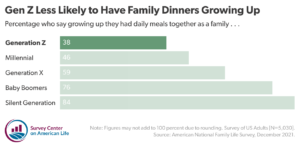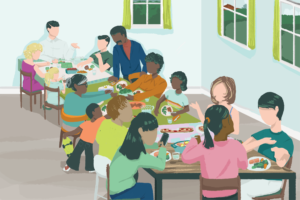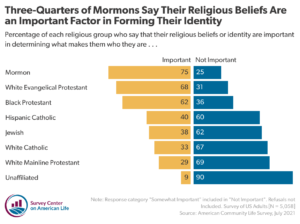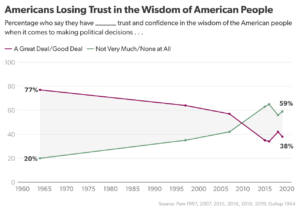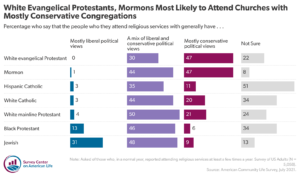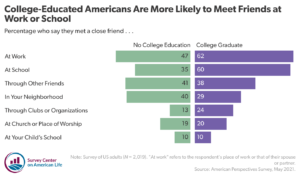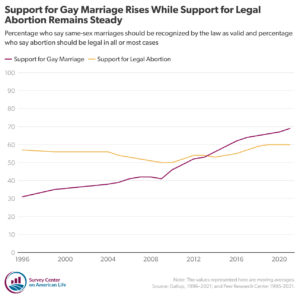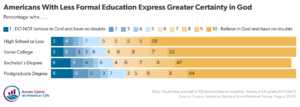All Research
CommentaryFebruary 23, 2022
Why Are White Liberals So Pessimistic About Politics?
No one seems happy about politics these days – but White Liberals are uniquely pessimistic.
Short ReadsFebruary 9, 2022
Few Gen Zers Grew Up Having Family Dinners
The family meal, once a regular part of American family life, has become a rarity. Americans who belong to Generation Z are far less likely to report having grown up sharing daily meals with their family than other Americans. Less than half of Gen Zers (38 percent) and Millennials (46 percent) say that their family
Survey ReportFebruary 9, 2022
Emerging Trends and Enduring Patterns in American Family Life
Family dynamics are always evolving, but the emergence of new technologies, shifting economic realities, new cultural sensibilities, and social arrangements have reshaped family life dramatically. But there are enduring patterns in American family life as well. Women still do far more of the household chores, including cooking, cleaning, and laundry. Formative experiences, such as divorce, parental favoritism, and relationships have far-reaching influence.
Short ReadsJanuary 21, 2022
Religion is Not an Important Source of Identity For Many Americans
Despite recent trends documenting an overall decline in religious belief, practice, and affiliation, most Americans still identify with a particular religious tradition. But surprisingly, a significant number of religious Americans say their religious beliefs or identity are not central to who they are. A majority of both White (67 percent) and Hispanic (60 percent) Catholics,
Short ReadsJanuary 6, 2022
Losing Confidence in Each Other
So much research and commentary have focused on the decline of public trust in various institutions—the media, government, police, the justice system. But over the last decade, we have also seen an erosion of the confidence that Americans have in each other. According to the Pew Research Center, only 38 percent of Americans report they are
CommentaryJanuary 4, 2022
Why The Republican Party Isn’t Concerned With Popularity
Despite the fact that the GOP is quite unpopular and that much of its current agenda, the party is in an enviable position heading into the 2022 midterm elections and beyond. Why?
Short ReadsDecember 20, 2021
Churches as Political Communities
We have long known that churches and religious congregations are important sources of political information and influence. Now, a new report finds that many Americans perceive their congregation as sharing a mix of liberal and conservative beliefs. However, certain traditions are much more likely to have uniformly conservative congregations. Nearly half of White evangelical Protestants (47 percent) and Mormons (47 percent) say that the people they attend religious services with have mostly conservative
Short ReadsDecember 16, 2021
The Importance of Work Friends
Americans who never attended college are experiencing a rapid social decline—they have fewer close friends and considerably less social support. Part of the reason may have to do with the fact that Americans without a college education have fewer workplace friends. Sixty-two percent of college graduates have a close friend they met through work, compared to 47
Short ReadsDecember 16, 2021
The Diverging Trajectories of Same-Sex Marriage & Abortion
In 1996, Americans were far more supportive of legal abortion than allowing gay and lesbian couples to marry. Only 31 percent of Americans favored same-sex marriage in the mid-1990s while nearly six in 10 (57 percent) said abortion should be legal in at least some circumstances. Today, nearly seven in 10 (69 percent) Americans believe
Short ReadsDecember 16, 2021
A Belief and Belonging Paradox?
Americans with less formal education tend to express greater certainty about their belief in God. Fifty-nine percent of Americans without a college education say they are certain God exists. Only 44 percent of those with post-graduate education say the same, although they are slightly more likely to express certainty that God does not exist. Despite


